The Role of AI in Enhancing User Experience in Mobile Apps
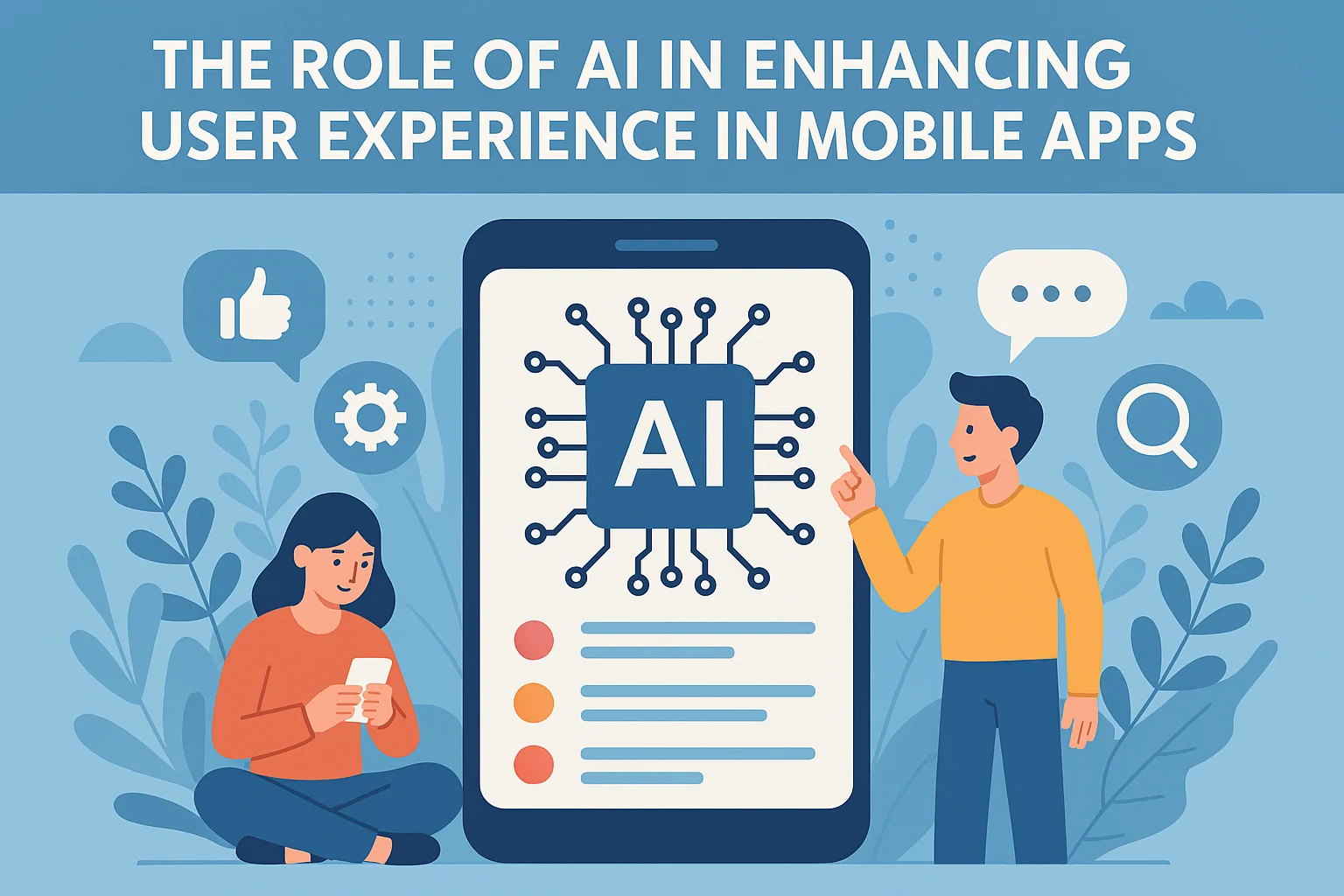
Artificial intelligence (AI) is transforming mobile app user experience (UX) by enabling features like predictive flows, adaptive interfaces, emotion-aware design, and voice-driven interactions, making apps faster, smarter, and more personalized. Around 700 million people used AI-powered apps in the first half of 2025 alone, demonstrating the rapid adoption of AI in mobile UX. Businesses are increasingly leveraging AI-driven solutions to enhance user experience, automate processes, and improve efficiency. AI-powered applications streamline development and provide personalized, intelligent interactions, making apps more engaging and effective.
AI enhances mobile app UX through several key capabilities. AI algorithms analyze vast amounts of user data to derive valuable insights and predictions. AI empowers developers to create intelligent and dynamic solutions that adapt to user preferences and behavior. AI can also automate repetitive tasks, such as customer support and data processing, freeing up app developers to focus on higher-value activities. Predictive analytics, a key area of AI, equips mobile apps with the ability to anticipate user needs and behavior.
Ultimately, the integration of AI into mobile app design aims to create experiences that feel natural and intuitive. Users now expect this level of personalization, and generative AI is helping development teams keep up without sacrificing the human element. AI-powered mobile UX offers a clear path to better engagement, higher retention, and deeper user loyalty, especially when designed with both empathy and business outcomes in mind. Companies that invest in AI to enhance their user experiences often see significant boosts in revenue.
Introduction to AI-Powered Mobile App UX
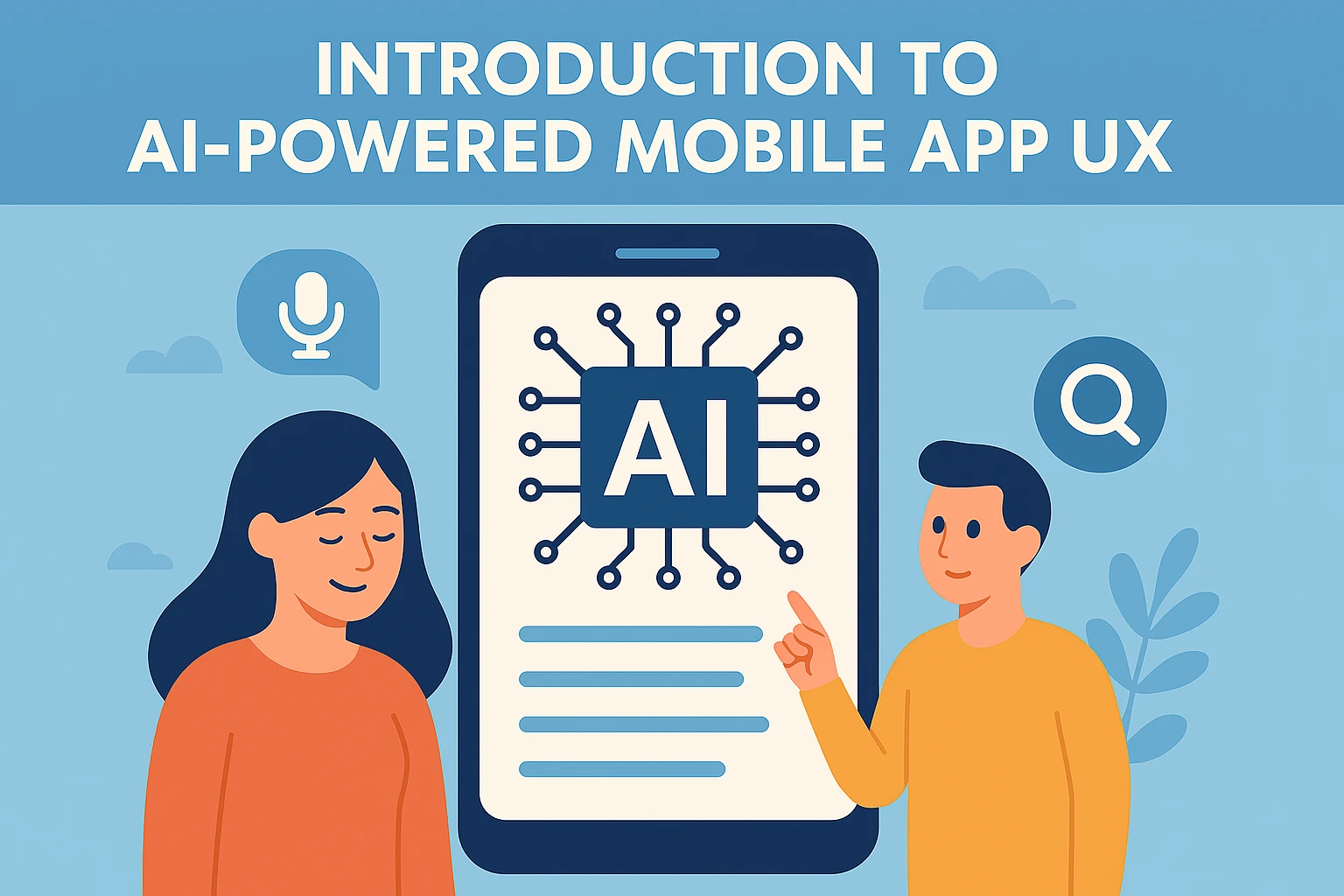
AI-powered mobile app UX refers to the integration of artificial intelligence technologies to improve the overall user experience of mobile applications. This involves leveraging machine learning (ML), natural language processing (NLP), and other AI techniques to create apps that are more responsive, personalized, and intuitive. The goal is to design interfaces that anticipate user needs, offer proactive assistance, and adapt to individual preferences in real-time.
At its core, AI in mobile app UX is about understanding the user better and creating a more seamless and enjoyable interaction. This can involve personalizing content, recommending relevant products or services, automating routine tasks, and providing intelligent support. By analyzing user behavior, preferences, and context, AI algorithms can tailor the app experience to each individual, making it feel more relevant and valuable. The transformative power of AI lies in its ability to turn static designs into dynamic, responsive experiences that evolve with the user over time.
Ultimately, the success of AI-powered mobile app UX hinges on responsible implementation, ethical considerations, and a deep understanding of user needs. By prioritizing user control, applying inclusive design practices, and implementing graceful error recovery paths, UX professionals can maximize AI's benefits, maintain user trust, and create intuitive digital products that are enjoyable to use. As AI technology continues to evolve, its potential to enhance mobile app UX is virtually limitless.
How AI is Transforming Mobile App UX
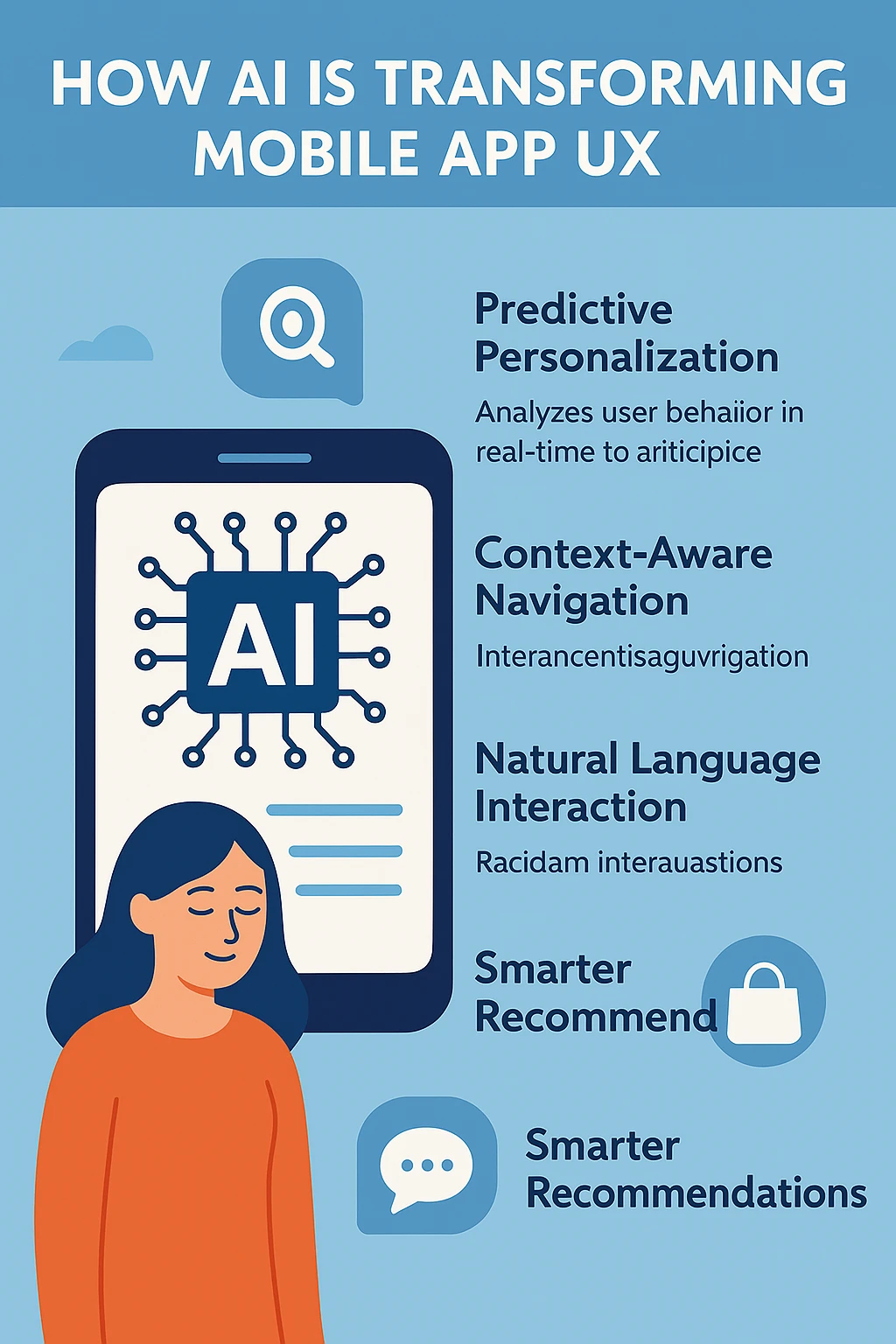
AI is transforming mobile app UX in several key areas, leading to more engaging, efficient, and personalized experiences. One significant way is through automation of routine tasks. AI algorithms can categorize emails, schedule reminders, and track expenses, streamlining processes and saving users time and effort. This frees users to focus on more important and engaging activities within the app.
AI is also enabling more intuitive and natural interactions. Technologies like NLP allow apps to understand and interpret user commands, facilitating seamless communication through voice recognition, text analysis, and chatbots. Moreover, AI-powered apps can scrutinize user behavior patterns to detect anomalies and potential security threats, safeguarding the integrity of user data and ensuring a secure user experience. Furthermore, AI is instrumental in delivering personalized notifications and content. By analyzing user activity and preferences, apps can deliver targeted messages and recommendations that resonate with users, fostering long-term engagement and loyalty.
AI enhances user experience by enabling features like predictive flows, adaptive interfaces, emotion-aware design, and voice-driven interactions, making apps faster, smarter, and more personalized. In 2025, AI is also responding to emotions in apps. The evolution of AI promises a future where mobile apps become even more integral to users' lives, offering unparalleled convenience, personalization, and value.
AI for Personalized Recommendations
AI algorithms can analyze vast amounts of user data to understand individual preferences and provide tailored recommendations for products, content, or services. This goes beyond simple demographic-based suggestions, taking into account browsing history, purchase patterns, social media interactions, and other relevant factors to create highly specific and relevant recommendations. Personalized recommendations enhance user experience by offering relevant content, products, or services. The core idea is to filter and prioritize options in a way that matches individual tastes and needs, making the user's journey more intuitive and engaging.
- E-commerce: AI can recommend products based on a user's past purchases, browsing history, and preferences, making the shopping experience more personalized and enjoyable.
- Media Streaming: Platforms like Netflix and Spotify use AI to analyze viewing or listening habits and provide personalized movie or music recommendations.
- News and Content Aggregation: AI can suggest relevant articles, videos, or podcasts based on a user's interests and reading history.
By providing personalized recommendations, AI increases user engagement, satisfaction, and loyalty. It also helps businesses drive sales, improve conversion rates, and enhance customer lifetime value. However, it is important to address challenges related to privacy, bias, and data quality to ensure recommendations remain effective and trustworthy.
AI-Driven Predictive Analytics
AI-driven predictive analytics empowers mobile apps with the ability to anticipate user needs and behaviors. By analyzing historical data, AI models can predict user preferences, optimize app performance, and suggest personalized actions. This proactive approach enhances user experiences, leading to increased app usage and customer loyalty. Predictive analytics is not just about understanding what your users are doing now, but anticipating what they'll need next.
- Predicting User Behavior: AI can analyze user data to predict what actions a user is likely to take next, allowing the app to proactively offer relevant features or content.
- Optimizing App Performance: By predicting potential performance issues, AI can help developers optimize app speed, stability, and resource usage.
- Personalizing User Journeys: AI can predict user preferences and tailor the app experience accordingly, creating a more seamless and engaging user journey.
Predictive analytics enable UX teams to stay ahead of your users' needs, offering solutions before issues even arise, thus creating a seamless and proactive user journey. Predictive UX leverages AI to analyze patterns in user behavior to proactively tailor future interactions, creating smoother experiences. From streaming platforms recommending content to ecommerce sites predicting purchase intent, AI is powering experiences that feel seamless and surprisingly relevant.
Key Benefits of AI for User Experience
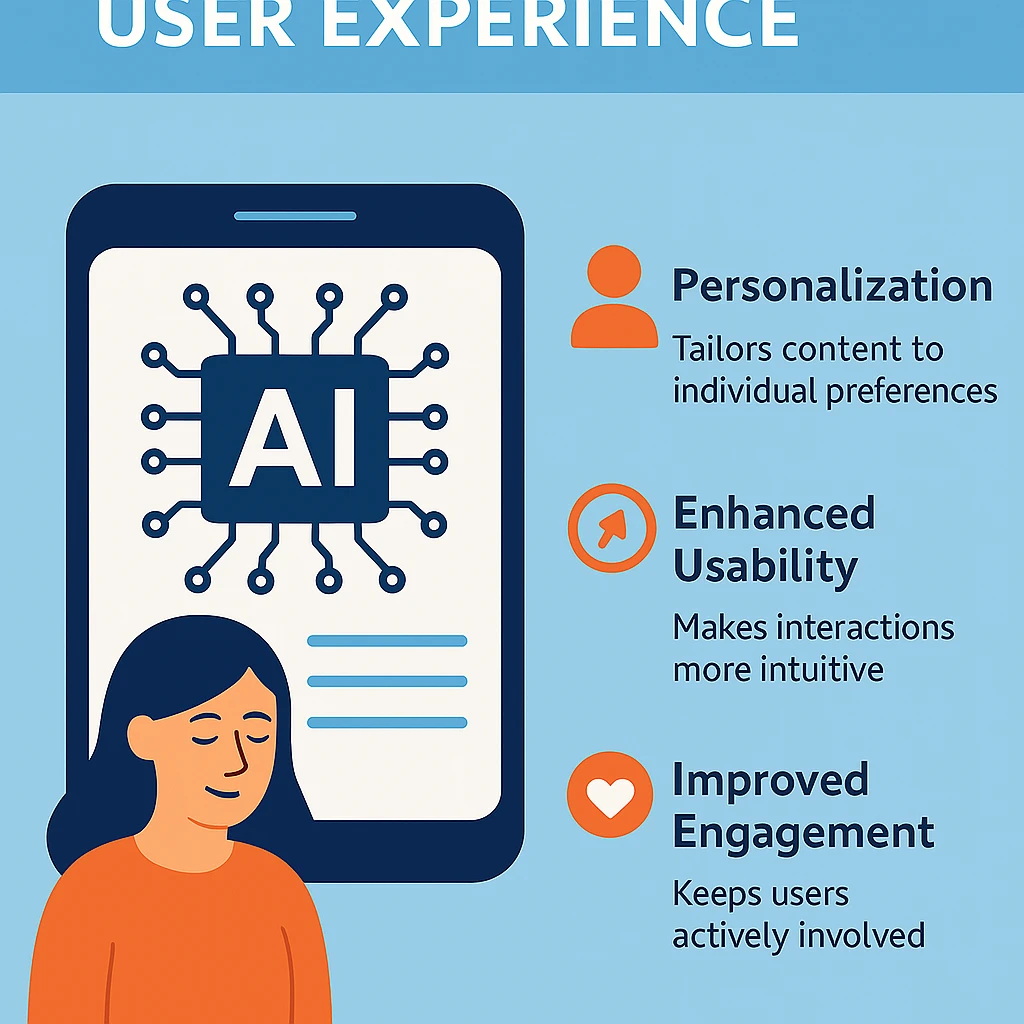
Integrating AI into UX/UI design has lots of benefits, improving both the effectiveness of the design process and the overall user experience. AI has revolutionized app development, allowing for a level of personalization that was once unimaginable. By analyzing user data such as behavior patterns, preferences, and interactions, AI algorithms can tailor app experiences to individual users, making them feel more connected and valued. Key benefits include:
- Enhanced Personalization: AI enables the creation of highly personalized experiences tailored to individual user preferences and behaviors.
- Improved User Assistance: AI can provide intelligent user assistance through natural interactions, such as voice commands, gestures, and facial recognition.
- Proactive Recommendations: AI can anticipate user needs and offer proactive recommendations, streamlining the user journey and enhancing engagement.
- Increased User Engagement: Personalized and efficient user experiences foster more profound engagement, encouraging users to spend more time with the digital product.
- Higher Conversion Rates: An optimized UX design powered by AI can improve usability and satisfaction, directly impacting conversion rates and revenue.
Integrating AI into UX design can significantly improve customer satisfaction and drive company growth. By utilizing AI's capabilities to understand and predict user needs, improve interactions, and constantly enhance digital products, companies can create exceptional user experiences that meet and exceed expectations.
Using AI to Adapt to User Preferences
AI's ability to learn and adapt to user preferences over time is a key element in creating truly personalized mobile app experiences. AI agents must account for linguistics & cultural context to adapt effectively to user needs. Instead of offering a static, one-size-fits-all experience, AI algorithms can continuously analyze user behavior and adjust the app's interface, content, and functionality to match individual needs. This adaptability is crucial for maintaining user engagement and satisfaction in the long run.
- Collecting User Feedback: AI systems can gather explicit feedback through surveys and ratings, as well as implicit feedback by observing user behavior.
- Machine Learning: Machine learning algorithms can analyze user data to discern patterns and predict preferences accurately.
- Natural Language Processing: NLP enables AI to understand and process user inputs conversationally and contextually.
As we look to the future, it's clear that these powerful AI agents capable of adapting to user preferences are more than just a novelty; they represent an essential part of technological evolution. This evolution allows users to feel heard and valued, fostering deeper connections. This convergence of personalization, AI ethics, & rich data analytics builds a pathway for creating even more advanced solutions that mimic human-like understanding .
AI-Powered Personalization in Mobile Apps
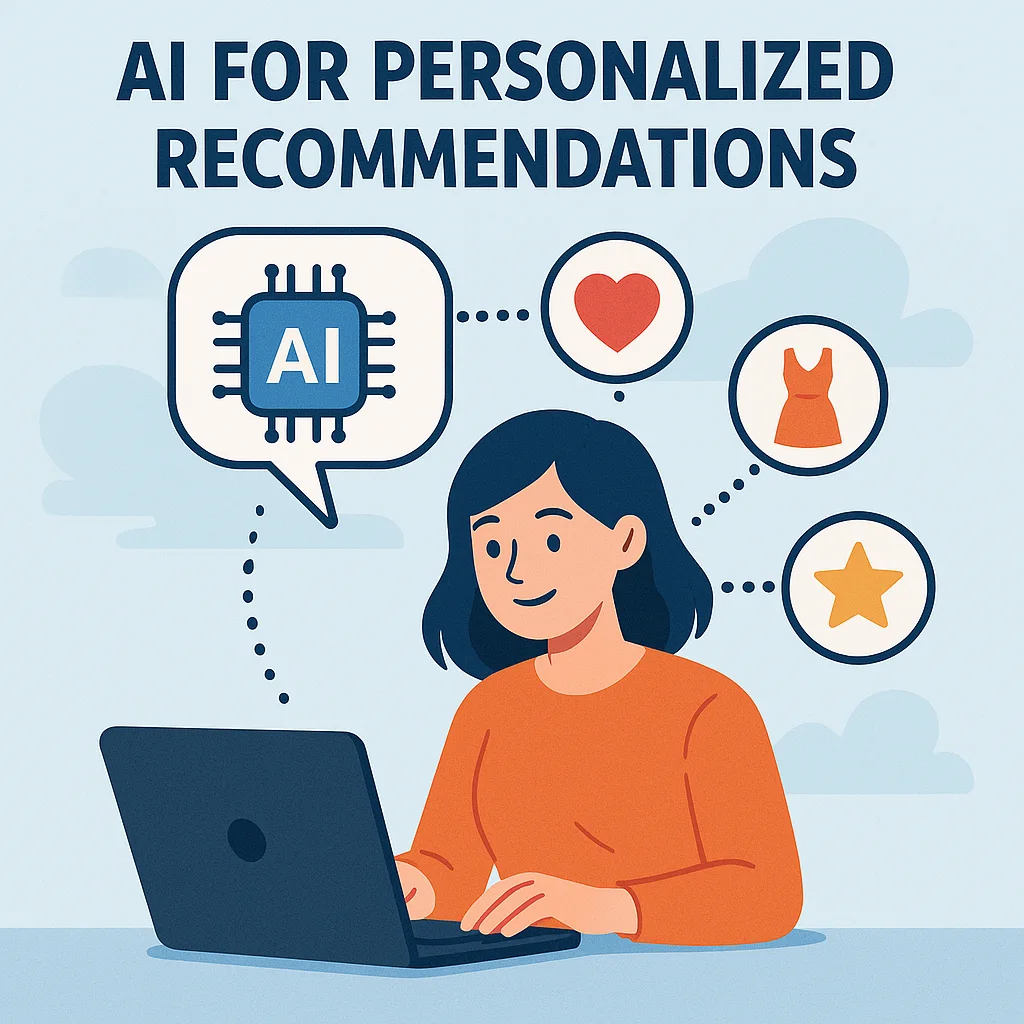
AI-powered personalization in mobile apps is revolutionizing the way users interact with technology . By analyzing user data, AI algorithms can tailor app experiences to individual users, making them feel more connected and valued. This level of personalization boosts user engagement and satisfaction, as the app feels more intuitive and aligned with each person's needs. AI has the capacity to create specific content for individual users, or to forecast customer needs. Some key aspects of AI-driven personalization include:
- Predictive Analytics: AI can predict user preferences and behavior by analyzing past interactions .
- Adaptive Interfaces: AI algorithms can adjust the app's interface based on the user's usage patterns, offering a more intuitive and user-friendly experience.
- Customized Content Delivery: Personalized content feeds based on user interests and interactions ensure that users see more of what they like, increasing engagement and time spent in the app.
As AI technology continues to advance, the possibilities for creating unique, engaging, and satisfying user experiences are virtually limitless. The integration of AI in app personalization is not just a trend; it's a transformation in how we interact with technology. By offering more personalized and engaging experiences, apps can significantly enhance user satisfaction and loyalty. For app developers and businesses, investing in AI-driven personalization is not just an option – it's a critical component for success in today's digital world.
Conclusion
In conclusion, artificial intelligence (AI) is revolutionizing mobile app user experience (UX) by enabling features like predictive flows, adaptive interfaces, emotion-aware design, and voice-driven interactions, thus making apps faster, smarter, and more personalized. The rapid adoption of AI in mobile UX is evident, with a significant number of people using AI-powered apps. Businesses are increasingly utilizing AI-driven solutions to improve user experience, automate processes, and boost efficiency. AI-powered applications streamline development and facilitate personalized, intelligent interactions, which leads to more engaging and effective apps .
Ultimately, integrating AI into mobile app design aims to create intuitive and natural experiences, meeting users' expectations for personalization. Generative AI assists development teams in maintaining a human element without sacrificing speed. AI-powered mobile UX provides a clear path to enhanced engagement, increased retention, and stronger user loyalty, particularly when designed with empathy and business outcomes in mind. Investing in AI to enhance user experiences can lead to significant revenue boosts for companies.